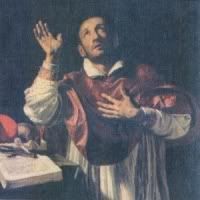November 4 - St. Charles Borromeo

NOVEMBER 4
ST. CHARLES BORROMEO
Charles lived in the sixteenth century. He was the son of a rich Italian count. Like other wealthy young men, he went to the University of Pavia. Unlike many of them, however, he would have nothing to do with sinful activities. He seemed to be a slow student because he was not a good speaker, but he really made good progress. He was only twenty-three when his uncle, Pope Pius IV, gave him many important duties. Charles managed to handle all his affairs well. He was always afraid that he might stray from God because of the many temptations around him. For this reason, he was careful to deny himself many pleasures and to make the effort to be humble and patient.
As a priest and later the cardinal archbishop of Milan, St. Charles was a model for his people. He gave away great amounts of money to the poor. He had only one shabby cassock (long black habit) to his name. In public, though, he dressed as a cardinal should. He attended with great care to the dignity and respect owed to Church ceremonies. In Milan the people had many bad practices and much superstition. By wise laws, by gentle kindness and by his own marvelous example, St. Charles made his diocese a model for the whole Church. He was never a good speaker-people could barely hear him-yet his words took effect.
When a terrible disease caused many deaths in Milan, Cardinal Borromeo thought of nothing else but caring for his people. He prayed and did penance. He organized crews of attendants and went into debt to feed the hungry. He even had altars set up in the streets. This was for the benefit of the sick who could assist at Mass from their windows.
This great man was never too busy to help simple people. He once stayed with a little shepherd boy until he had taught him the Our Father and the Hail Mary. As he lay dying at the age of forty-six, St. Charles said peacefully, "Behold, I come!" He died on November 3, 1584, and was proclaimed a saint by Pope Paul V in 1610.


0 Comments:
Post a Comment
<< Home